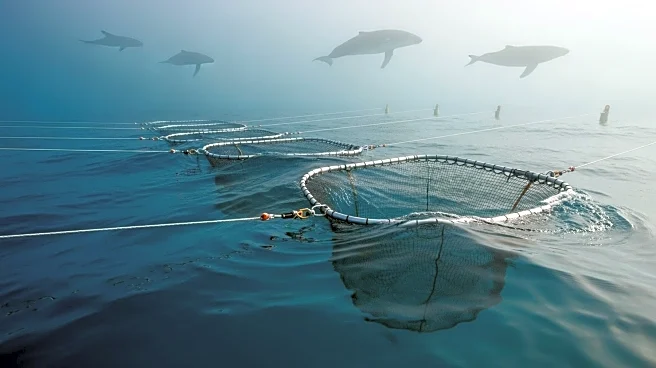What is the story about?
What's Happening?
Queensland Premier David Crisafulli has reaffirmed his commitment to expanding the state's shark net program, despite recent incidents involving whale entanglements. A mother and baby humpback whale were recently trapped in shark netting near Rainbow Beach, marking the eighth and ninth such incidents in nine days. Crisafulli announced the expansion of the shark net program in May, following a KPMG report that recommended trialing the removal of shark nets during whale migration season, as practiced in New South Wales. However, Crisafulli stated that the protection of human lives would not be compromised for environmental concerns, emphasizing the importance of safeguarding swimmers. Queensland is one of three jurisdictions globally that utilize shark nets, alongside drum lines that bait sharks. The state government plans to increase swimmer protection while attempting to minimize environmental impact.
Why It's Important?
The decision to expand the shark net program in Queensland has sparked debate over the balance between human safety and environmental conservation. While the program aims to protect swimmers from shark attacks, it has led to significant marine life entanglements, including whales, turtles, and dolphins. Critics argue that the nets do not effectively target shark species and pose a threat to non-target marine animals. The expansion of the program could lead to increased scrutiny from environmental groups and calls for alternative solutions that prioritize both human safety and marine conservation. The issue highlights the ongoing challenge of managing human-wildlife interactions in coastal areas.
What's Next?
The Queensland government is expected to continue its shark net program expansion, with potential adjustments to minimize environmental impact. Environmental groups may increase advocacy efforts for alternative shark control measures, such as drone surveillance or non-lethal deterrents. The government may face pressure to reconsider its approach, especially if whale entanglements persist. Stakeholders, including marine biologists and conservationists, are likely to engage in discussions to find a balanced solution that addresses both human safety and environmental concerns.
Beyond the Headlines
The expansion of shark nets raises ethical questions about the prioritization of human safety over marine life conservation. The entanglement incidents highlight the need for innovative solutions that can protect both swimmers and marine ecosystems. Long-term, the situation may prompt broader discussions on sustainable coastal management practices and the role of technology in wildlife protection.















